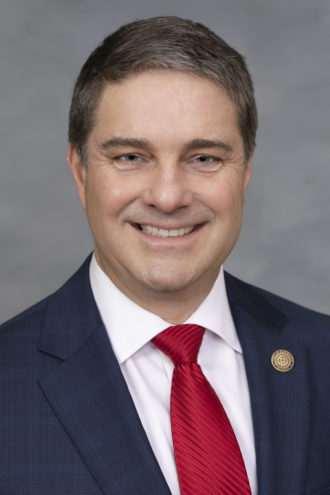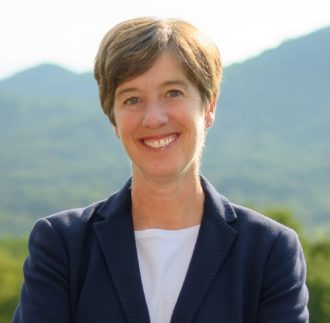Newly elected Rep. Lindsey Prather had expected to wrestle with tough questions upon her arrival at the N.C. General Assembly in Raleigh. After all, the Buncombe County Democrat had promised her constituents that she’d work on big issues such as school funding, Medicaid expansion and climate resilience.
Prather did not expect one of those questions to be where the furniture was.
“I didn’t think about the fact that I’d have to furnish my legislative office. So that’s coming together slowly,” confesses Prather. Although desks and chairs can be borrowed from the legislative building, she says, many members bring their own.
Prather and her two Buncombe County colleagues in the state House — Democrats Eric Ager and Caleb Rudow — will have many such learning experiences over the legislative session that started Jan. 25. All three won their first elections in November after the retirement of three multiterm representatives of the county.
Getting situated
The General Assembly can be daunting even for longtime political hands. Zach Wallace, vice president of public policy at the Asheville Area Chamber of Commerce, calls the legislature’s Raleigh campus “super confusing.” He visits the House several times a year to work directly with members.
“I’ve spent a lot of time there and can’t get anywhere, so I just walk the edge of the building until I find the office that I’m looking for,” Wallace says. “I’m sure for our new members, they’re trying to figure that out, too. Where’s the bathroom? Where am I supposed to park? All those things.”

Another logistical concern, particularly for legislators from Western North Carolina who have a four-hour commute to the capital, is where to stay. The House is usually in session from Monday evening through Thursday afternoon, and most members travel home for the weekends to their jobs, families, constituents and other responsibilities.
Finding a place to spend the weeknights in Raleigh can be an added stressor. State lawmakers do receive a $104 per diem for each day they are in session to defray the costs, but their annual salary of just under $14,000 hasn’t changed since 1995.
“I’m extremely lucky that my parents live in the next town over and I can stay with them,” Prather says. “Other legislators have rented rooms in houses, stayed in hotels, crashed with friends, split rent with a colleague and even stayed in an RV.”
The travel time also makes it more challenging for representatives to form and deepen relationships, both in the capital and at home. Commuting means they aren’t around Raleigh on the weekends to spend time with their colleagues, and they also miss weekday events back home in Buncombe. “These are barriers that keep a lot of people from being able to serve,” says Prather.
Seven-term Republican Sen. Warren Daniel, whose district now includes much of eastern Buncombe County, agrees that the first few months of service can be disorienting. “Being a member of the General Assembly can be a full-time, 24/7 job,” he says. He advises his new colleagues: “Make sure you don’t let it adversely affect the time you spend with your family.”
Law and order
In addition to learning the physical lay of the land, new members must also become familiar with how the House operates. Its rules include guidance on everything from when to speak and how to vote to more basic matters like when to eat (not during the first hour of sessions.)
House members have until April this year to introduce new bills. After a lawmaker drafts and presents a proposal, it’s assigned to a committee for consideration — and that’s where most go to die. During the legislature’s 2021-22 long session, over 2,000 bills were presented, but only 267 were passed into law.
If a committee approves the bill, it gets placed on the legislative calendar to be voted on by all members of the House. When the bill is presented to the chamber, members have the opportunity to speak: supporting it, refuting it or recommending amendments. If it passes there, it then goes to the state Senate, and then to the desk of Gov. Roy Cooper for approval or veto.

Julie Mayfield, a Democratic state senator from Asheville now in her second term, says she was surprised as a new lawmaker by how little debate happens on the General Assembly floor. “I wish I had known really how little moves forward in the Senate, how little we debate in committee, how little work on bills actually happens in public,” she tells Xpress. “Virtually everything happens behind the scenes, in small conversations, and bills that come to the floor are going to pass. Amendments will be tabled, and there will not be any real debate or question about the outcome.”
One new potential challenge for the rookie legislators comes from Republican House members, who have proposed a rule change that would allow votes on overriding Cooper’s veto to be held without advance notice. (Cooper has vetoed 75 bills since taking office in 2017, more than all other North Carolina governors combined.)
Republicans currently hold 71 seats in the 120-member chamber, one short of the three-fifths majority required to overturn a veto. If the rule change were to pass, Democratic leaders argue, Republicans voting in unison could thus override a veto whenever one Democrat happened to be absent from the House floor.
Rep. Ager says he’s disappointed by that effort to change the rules, which will be voted on later this month. “I am a believer in conducting the people’s business in a clear and transparent manner, and the rules change seems to me to be an attempt to sneak things through with parliamentary tricks,” he explains.
General interest
Despite those concerns, Rudow says members are generally able to work together regardless of party affiliation. Although he’s in his first elected term, Rudow was appointed last February to finish the term of retiring House Democrat Susan Fisher.
“Unlike the U.S. House, the N.C. House has an environment of respect and cordiality across the aisle,” says Rudow. “We disagree on many issues, but there are also lots of policy issues that Democrats and Republicans work on together.”
Wallace of the Asheville Area Chamber of Commerce agrees with that sentiment. “Most of us agree on a lot more than we think we do,” he says, but “it’s hard to get to that point if you don’t know each other.” With that in mind, Wallace and the chamber are hoping to encourage more communication and informal meetings between legislative members this session, especially those representing WNC.
There are many issues to consider. Rudow says he hadn’t expected to be confronted with the breadth of topics that constituents, activists and lobbyists care about. He cites spaying/neutering community cats and sensory deprivation tanks as some of the unanticipated concerns people have raised; Prather mentions minibike regulations.
But no matter the topic, Rudow continues, “The core of the work is about understanding people, their challenges, and how policy can solve them.”



I appreciate the insight into the more mundane aspects of members’ experience as representatives of the people. It’s also useful to read that members have the opportunity to conduct civil discussions among themselves to foster collegiality and increase effectiveness. Too many media articles focus on the dysfunction of the parties. It was refreshing to read one that didn’t lead with conflict.
Our leaders need Tik Tok accounts like House Representative Jeff Jackson. They need to directly speak to people just like him and tell us what is happening in North Carolina’s legislature.